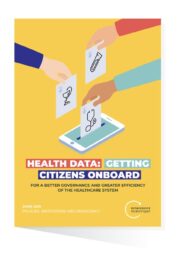Publication 24 June 2021
Health data: Getting citizens onboard

Health data : a game-changer for the governance of the healthcare system ?
In the healthcare field, as in other fields, data constitutes a tool for steering and management. It is an important component of the transparency of public authorities’ decision-making, and can also be used to control the efficiency of public policies. For example, during the Covid-19 pandemic, the platform dashboard.covid19.data.gouv.fr allowed for anyone to check the evolution of the epidemic situation and to visualise all the available data in map format.
But the value of data sharing and processing in the healthcare sector goes well beyond crisis-management. Although the imperatives of the health crisis reinforced public interest towards health data, the link between data and the healthcare sector dates from a time long before the digital transformation of healthcare systems.
Provided that the necessary (legal, technical and ethical) safeguards required due to its sensitive nature are in place, this kind of data can be used to improve and smooth out treatment plans, develop telemedicine, make progress in scientific research (especially epidemiological), steer healthcare systems, or even develop preventive medicine which, despite it being prioritised, lacks a concrete presence in the field.
However, for the time being, health data remains difficult to understand by certain actors in the health service value chain, especially considering its heterogeneity, its complicated governance, and its highly sensitive nature. The processing of health data is strictly regulated by law, particularly by the General Data Protection Regulation (GDPR) at the European level, and the Health Code and Penal Code (amongst others) in France.
Franck Lethimonnier
Director of the “Technologies for Health” thematic institute, Inserm
In addition, health data is usually compartmentalised and not very interoperable, which makes it even more complex to process, mix and match. Because of its wide-ranging diversity, both in its nature, source, even its end purpose, it is dispersed in a multitude of databases that do not necessarily communicate, and which are administered by different actors in the health services chain.
In order for all actors in the chain, particularly citizens, to be able to fully grasp the (ethical, juridical and technical) issues linked to health data, some serious acculturation efforts are needed.
For a shared culture of health data
Despite it being central to numerous national and European projects (whether public, private, or public-private), digital health data remains rather misunderstood. As have revealed the close to forty interviews carried out in the framework of this report, this difficulty is not exclusive to “average users”. We equally observed major gaps in health data comprehension between healthcare professionals, sectoral associations, and public decision-makers. Thus, there is a need to create a real culture of its own around data
Jelena Malinina
Digital Health Policy Officer, BEUC
RECOMMANDATIONS
Recommandation n°1
Recommandation n°2
Recommandation n°3
Recommandation n°4
Empowering citizens to take control over their personal health data is all the more crucial as it is a key component of their ability to get involved in the debates around it, from which they are often excluded.
Redefine data governance for a more efficient and democratic healthcare system
Despite the efforts made as part of the digital component of the “Ma Santé 2022” national strategy, the governance of health data remains unclear. Many players (the Ministry of Solidarity and Health, the Secretary of State for Digital Affairs, the Digital Health Agency (ANS), the National Health Insurance Fund (CNAMTS) and Santé publique France) share the steering of public policy in this area, with missions that sometimes overlap.
Clarifying the governance of this data must involve, on the one hand, clarifying the role of the various actors involved in their production, collection, sharing and processing. On the other hand, it must involve clarifying the (technical and legal) methods of producing, collecting, sharing and processing these data.
RECOMMANDATIONS
Recommandation n°5
Recommandation n°6
Recommandation n°7
Recommandation n°58
Redefining the governance of health data should be an opportunity to put citizens at the heart of the digital transformation of the health system. The growing use of health data in patient treatments and for research purposes concerns the entire population, young and old alike, people with diseases and those in good health. However, patients’ associations are very often recognised as the only entities representing the population with sufficient legitimacy to be consulted by health authorities.
Beyond patients and patient organisations, a greater role should be given to advocacy groups and citizens as a whole in the development and implementation of public health policy. In other words, the notion of “health democracy” should be given its full meaning and put to use.

